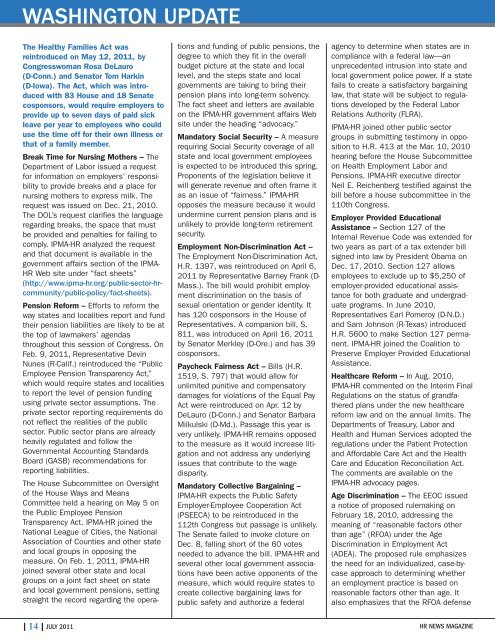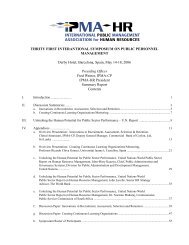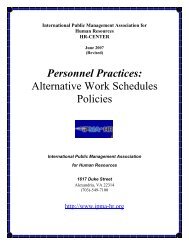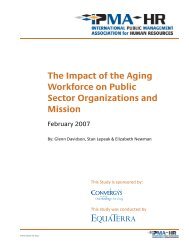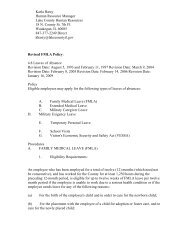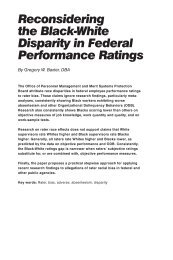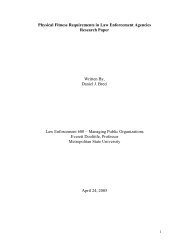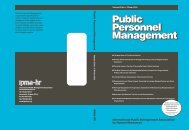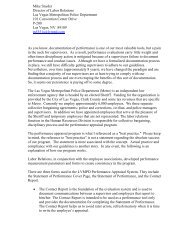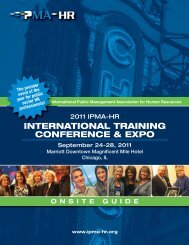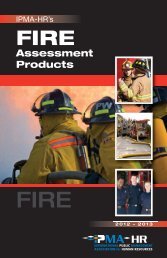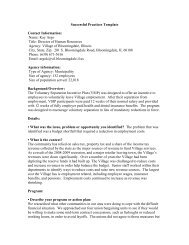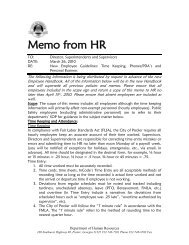July 2011 issue of HR News magazine - IPMA
July 2011 issue of HR News magazine - IPMA
July 2011 issue of HR News magazine - IPMA
You also want an ePaper? Increase the reach of your titles
YUMPU automatically turns print PDFs into web optimized ePapers that Google loves.
WASHINGTON UPDATE<br />
The Healthy Families Act was<br />
reintroduced on May 12, <strong>2011</strong>, by<br />
Congresswoman Rosa DeLauro<br />
(D-Conn.) and Senator Tom Harkin<br />
(D-Iowa). The Act, which was introduced<br />
with 83 House and 18 Senate<br />
cosponsors, would require employers to<br />
provide up to seven days <strong>of</strong> paid sick<br />
leave per year to employees who could<br />
use the time <strong>of</strong>f for their own illness or<br />
that <strong>of</strong> a family member.<br />
Break Time for Nursing Mothers – The<br />
Department <strong>of</strong> Labor <strong>issue</strong>d a request<br />
for information on employers’ responsibility<br />
to provide breaks and a place for<br />
nursing mothers to express milk. The<br />
request was <strong>issue</strong>d on Dec. 21, 2010.<br />
The DOL’s request clarifies the language<br />
regarding breaks, the space that must<br />
be provided and penalties for failing to<br />
comply. <strong>IPMA</strong>-<strong>HR</strong> analyzed the request<br />
and that document is available in the<br />
government affairs section <strong>of</strong> the <strong>IPMA</strong>-<br />
<strong>HR</strong> Web site under “fact sheets”<br />
(http://www.ipma-hr.org/public-sector-hrcommunity/public-policy/fact-sheets).<br />
Pension Reform – Efforts to reform the<br />
way states and localities report and fund<br />
their pension liabilities are likely to be at<br />
the top <strong>of</strong> lawmakers’ agendas<br />
throughout this session <strong>of</strong> Congress. On<br />
Feb. 9, <strong>2011</strong>, Representative Devin<br />
Nunes (R-Calif.) reintroduced the “Public<br />
Employee Pension Transparency Act,”<br />
which would require states and localities<br />
to report the level <strong>of</strong> pension funding<br />
using private sector assumptions. The<br />
private sector reporting requirements do<br />
not reflect the realities <strong>of</strong> the public<br />
sector. Public sector plans are already<br />
heavily regulated and follow the<br />
Governmental Accounting Standards<br />
Board (GASB) recommendations for<br />
reporting liabilities.<br />
The House Subcommittee on Oversight<br />
<strong>of</strong> the House Ways and Means<br />
Committee held a hearing on May 5 on<br />
the Public Employee Pension<br />
Transparency Act. <strong>IPMA</strong>-<strong>HR</strong> joined the<br />
National League <strong>of</strong> Cities, the National<br />
Association <strong>of</strong> Counties and other state<br />
and local groups in opposing the<br />
measure. On Feb. 1, <strong>2011</strong>, <strong>IPMA</strong>-<strong>HR</strong><br />
joined several other state and local<br />
groups on a joint fact sheet on state<br />
and local government pensions, setting<br />
straight the record regarding the opera-<br />
tions and funding <strong>of</strong> public pensions, the<br />
degree to which they fit in the overall<br />
budget picture at the state and local<br />
level, and the steps state and local<br />
governments are taking to bring their<br />
pension plans into long-term solvency.<br />
The fact sheet and letters are available<br />
on the <strong>IPMA</strong>-<strong>HR</strong> government affairs Web<br />
site under the heading “advocacy.”<br />
Mandatory Social Security – A measure<br />
requiring Social Security coverage <strong>of</strong> all<br />
state and local government employees<br />
is expected to be introduced this spring.<br />
Proponents <strong>of</strong> the legislation believe it<br />
will generate revenue and <strong>of</strong>ten frame it<br />
as an <strong>issue</strong> <strong>of</strong> “fairness.” <strong>IPMA</strong>-<strong>HR</strong><br />
opposes the measure because it would<br />
undermine current pension plans and is<br />
unlikely to provide long-term retirement<br />
security.<br />
Employment Non-Discrimination Act –<br />
The Employment Non-Discrimination Act,<br />
H.R. 1397, was reintroduced on April 6,<br />
<strong>2011</strong> by Representative Barney Frank (D-<br />
Mass.). The bill would prohibit employment<br />
discrimination on the basis <strong>of</strong><br />
sexual orientation or gender identity. It<br />
has 120 cosponsors in the House <strong>of</strong><br />
Representatives. A companion bill, S.<br />
811, was introduced on April 16, <strong>2011</strong><br />
by Senator Merkley (D-Ore.) and has 39<br />
cosponsors.<br />
Paycheck Fairness Act – Bills (H.R.<br />
1519, S. 797) that would allow for<br />
unlimited punitive and compensatory<br />
damages for violations <strong>of</strong> the Equal Pay<br />
Act were reintroduced on Apr. 12 by<br />
DeLauro (D-Conn.) and Senator Barbara<br />
Milkulski (D-Md.). Passage this year is<br />
very unlikely. <strong>IPMA</strong>-<strong>HR</strong> remains opposed<br />
to the measure as it would increase litigation<br />
and not address any underlying<br />
<strong>issue</strong>s that contribute to the wage<br />
disparity.<br />
Mandatory Collective Bargaining –<br />
<strong>IPMA</strong>-<strong>HR</strong> expects the Public Safety<br />
Employer-Employee Cooperation Act<br />
(PSEECA) to be reintroduced in the<br />
112th Congress but passage is unlikely.<br />
The Senate failed to invoke cloture on<br />
Dec. 8, falling short <strong>of</strong> the 60 votes<br />
needed to advance the bill. <strong>IPMA</strong>-<strong>HR</strong> and<br />
several other local government associations<br />
have been active opponents <strong>of</strong> the<br />
measure, which would require states to<br />
create collective bargaining laws for<br />
public safety and authorize a federal<br />
agency to determine when states are in<br />
compliance with a federal law—an<br />
unprecedented intrusion into state and<br />
local government police power. If a state<br />
fails to create a satisfactory bargaining<br />
law, that state will be subject to regulations<br />
developed by the Federal Labor<br />
Relations Authority (FLRA).<br />
<strong>IPMA</strong>-<strong>HR</strong> joined other public sector<br />
groups in submitting testimony in opposition<br />
to H.R. 413 at the Mar. 10, 2010<br />
hearing before the House Subcommittee<br />
on Health Employment Labor and<br />
Pensions. <strong>IPMA</strong>-<strong>HR</strong> executive director<br />
Neil E. Reichenberg testified against the<br />
bill before a house subcommittee in the<br />
110th Congress.<br />
Employer Provided Educational<br />
Assistance – Section 127 <strong>of</strong> the<br />
Internal Revenue Code was extended for<br />
two years as part <strong>of</strong> a tax extender bill<br />
signed into law by President Obama on<br />
Dec. 17, 2010. Section 127 allows<br />
employees to exclude up to $5,250 <strong>of</strong><br />
employer-provided educational assistance<br />
for both graduate and undergraduate<br />
programs. In June 2010,<br />
Representatives Earl Pomeroy (D-N.D.)<br />
and Sam Johnson (R-Texas) introduced<br />
H.R. 5600 to make Section 127 permanent.<br />
<strong>IPMA</strong>-<strong>HR</strong> joined the Coalition to<br />
Preserve Employer Provided Educational<br />
Assistance.<br />
Healthcare Reform – In Aug. 2010,<br />
<strong>IPMA</strong>-<strong>HR</strong> commented on the Interim Final<br />
Regulations on the status <strong>of</strong> grandfathered<br />
plans under the new healthcare<br />
reform law and on the annual limits. The<br />
Departments <strong>of</strong> Treasury, Labor and<br />
Health and Human Services adopted the<br />
regulations under the Patient Protection<br />
and Affordable Care Act and the Health<br />
Care and Education Reconciliation Act.<br />
The comments are available on the<br />
<strong>IPMA</strong>-<strong>HR</strong> advocacy pages.<br />
Age Discrimination – The EEOC <strong>issue</strong>d<br />
a notice <strong>of</strong> proposed rulemaking on<br />
February 18, 2010, addressing the<br />
meaning <strong>of</strong> “reasonable factors other<br />
than age” (RFOA) under the Age<br />
Discrimination in Employment Act<br />
(ADEA). The proposed rule emphasizes<br />
the need for an individualized, case-bycase<br />
approach to determining whether<br />
an employment practice is based on<br />
reasonable factors other than age. It<br />
also emphasizes that the RFOA defense<br />
| 14 | JULY <strong>2011</strong> <strong>HR</strong> NEWS MAGAZINE


